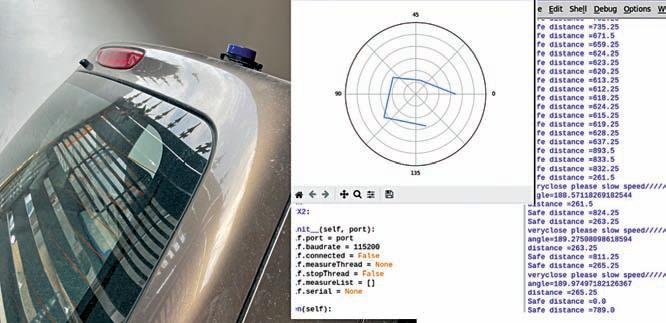
These use proximity sensors, cameras, and/or a lidar system. This project proposes to build a simple anti-collision system with a lidar.
Fig. 1 shows the lidar mounted on a car, along with the data generated by it for giving an alert. The components required to build the project are mentioned under Table 1.
You can use any lidar that is compatible with Python and has a Python SDK module for development, such as RPi lidar, YDLIDAR, Intel Real Sense lidar, and Velodyne lidar. The price of lidars available in the market varies considerably and so does their detection range. Most of them use USB serial communication.
In our design, we used YDLIDAR X2, but you can use any of the above-mentioned lidars. However, it is important to go through the datasheet (can search on Google) of the lidar and the Python module you are using to create the code around them.
In the datasheet, we can see the table that tells us that the field of view of this lidar is 360 degrees. So, this lidar can sense in any direction as it uses a motor to rotate. Some lidars provide 250- or 180-degree coverage only, so you need to choose the lidar as per your need.
The second important aspect of a lidar is its range and the conditions under which it can work. Some lidars use IR laser or red laser to work, some use doppler waves, and some others may be using yet another technology. So, to design a solution that works even in a foggy or rainy environment, we need to select the lidar accordingly.
In our design we have used laser-based YDLIDAR X2, whose parameters are given in Table 2 and whose image is shown in Fig. 2.
Denne historien er fra June 2023-utgaven av Electronics For You.
Start din 7-dagers gratis prøveperiode på Magzter GOLD for å få tilgang til tusenvis av utvalgte premiumhistorier og 9000+ magasiner og aviser.
Allerede abonnent ? Logg på
Denne historien er fra June 2023-utgaven av Electronics For You.
Start din 7-dagers gratis prøveperiode på Magzter GOLD for å få tilgang til tusenvis av utvalgte premiumhistorier og 9000+ magasiner og aviser.
Allerede abonnent? Logg på
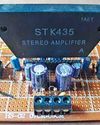
STK435 IC-Based STEREO AMPLIFIER
This stereo AF amplifier uses the STK435 IC, a highly popular choice due to its simplicity.

A SEWER DRAIN SHIELD For Smart Cities
Drainage systems are vital for storm water management but often transport pollutants, especially plastics, to rivers and oceans, harming ecosystems.

ESP32 SPEECH FUNCTION: Text To Speech
Speech capability in technology primarily has two dimensions: text to speech (TTS) and speech to text (STT). This device focuses on TTS.
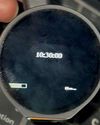
World's Smallest Programable INDUSPHONE DESIGN
This is the second part of designing the world’s smallest phone, where the UI is integrated with the basic functions of the phone.
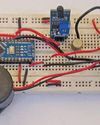
FLAME-SENSING FIRE ALARM Using An Arduino Nano
Fire safety alarms are crucial in both residential and industrial environments.
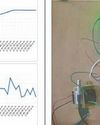
loT-Based Distribution Transformer CONDITION MONITORING SYSTEM
The proposed IoT-based distribution transformer condition monitoring system enables real-time monitoring of distribution transformers, identifying such deviations as overload conditions and overheating.

Wi-Fi 6 AND Wi-Fi 7 Powering The Next Wave of Smart Connectivity
Wi-Fi 6 leads with faster data rates and reduced latency while upcoming Wi-Fi 7's backward compatibility will facilitate gradual upgrades from Wi-Fi 6, easing transitions. However, advanced features like multi-link operation (MLO) and ultra-low latency may command a premium, making Wi-Fi 7 suited for high-end applications.

CHARGE FORWARD: High-Voltage Batteries And MSMEs Can Fuel INDIA'S EV REVOLUTION
A nuanced explanation of low- and high-voltage EV batteries by Dr Gokhale, Vice President for Battery Technology at JSW Energy, illuminates their advancements and influence. The essential role of MSMEs and academia in developing a strong EV ecosystem emerges, marking their significance for India's push towards self-reliance in this innovative field.

"MILES TO GO Before I Sleep"
A teacher illuminates the path to success through the light of knowledge, yet some teachers extend that light to society through their contributions and research. Known as the architect of the modern M3 electronic voting machine (EVM) and the voter verifiable paper audit trail (VVPAT) that transformed India's democratic process, Prof. (Dr) Rajat Moona's journey began in the modest town of Bareilly. Here is his story, as recounted to and written by EFY's Yashasvini Razdan.

STARTUPS & INNOVATORS
1 One Charger To Charge All Your Devices | 2 Harnessing AI Technology For Efficient Pest Management | 3 Wireless Light-Based Communication With Velmenni's Technology